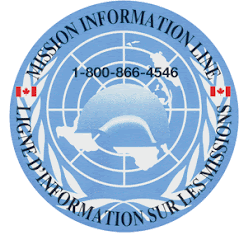Lieutenant-Commander Albert Wong knows all about the incidents that make the news, but he also knows about a whole other side of the Afghanistan story that rarely makes the front page — and that, he says, is really too bad, because a lot of them actually contain good news for the country and its people.
Wong, who works out of the National Defence Public Affairs office in Toronto, met with and spoke before the support group "Families of Canadian Soldiers in Aghanistan" in Waterloo on Saturday evening. His message is that Canada is making a very real and positive difference in a lot of people’s lives.
“I was in Afghanistan for one year, from August, of 2005 to August of 2006,” he says. “I was sent there as part of a Canadian government team of 15 people called the Strategic Advisory Team (Afghanistan) and our mandate was to help the government ... build the capacity for strategic planning, helping them develop plans and strategies for economic development and for the progress of the country in areas like health, education and rural development.”
Although he concedes the battles and bombs make more headlines, it’s the quiet work on the ground, in the cities and the rural countryside, that is key to getting the war-ravaged countries — one of the poorest in the world — back on its feet.
“First of all, there is a roadmap the government has for their people, and they’ve consulted widely in the country,” he says. “They have a five-year development strategy, weighted towards the rural population. Through this strategy we want to help increase the indicators of life. We need to help them find their footing after 30 years of war.”
What this means, he says, is improving the literacy rate, particularly for women, decreasing the infant mortality rate and providing employment opportunities as well as food self-sufficiency.
This, he says, comes in the form of constructing schools and medical clinics, and a national solidarity program funded through the Canadian International Development Agency (CIDA) but run by the Afghan government. In this program, villagers elect a community development council through secret ballot and they plan, implement and monitor their own development projects.
“We see a lot of hope and promise,” Wong says. “We are still at a crossroads, but they have a clear plan and the international community is committed to that plan in terms of support,” Wong says. “We’re in the first year of that plan and we need to follow through.”
Although Wong says the aid to Afghanistan has managed to increase the daily income by 100 per cent to some of the poorest people in the country, that only works out to an increase from 50 cents per day to $1. The minimum poverty standard recognized around the world is $2 per day.
“We still have a long way to go,” he concedes.
The resurgent Taliban have caused disruptions, but only to about one percent of the projects funded by the Canadians, Wong says.
“The Taliban definitely slows down the development program,” he says. “You need security for development and very clearly the fighting has affected the development, but it hasn’t stopped it. We had significant battles last fall and in the wake of that, two things happened. First, the people who fled ahead of the fighting didn’t go to Pakistan. They went to Kandahar City for shelter. It’s an expression of confidence in their own country. After the fighting we went right back in and put in a significant amount of effort to rebuild what was destroyed, regardless of who did it.”
Of those who fled the Panjawar District, 70 per cent returned home after the fighting, another sign there’s a growing confidence in the government, Wong says.
Being able to help people in such a basic and important way was rewarding for Wong, and for many other Canadian personnel involved in the country. He says he plans to go back at the first opportunity.
“I don’t know when I’ll go back, but I will,” he says. “You talk to most of the Canadian soldiers who come back, and they would want to go back. It’s a worthwhile mission ... The biggest fear Afghans have is to be left behind by the international community again.”
Wong, who works out of the National Defence Public Affairs office in Toronto, met with and spoke before the support group "Families of Canadian Soldiers in Aghanistan" in Waterloo on Saturday evening. His message is that Canada is making a very real and positive difference in a lot of people’s lives.
“I was in Afghanistan for one year, from August, of 2005 to August of 2006,” he says. “I was sent there as part of a Canadian government team of 15 people called the Strategic Advisory Team (Afghanistan) and our mandate was to help the government ... build the capacity for strategic planning, helping them develop plans and strategies for economic development and for the progress of the country in areas like health, education and rural development.”
Although he concedes the battles and bombs make more headlines, it’s the quiet work on the ground, in the cities and the rural countryside, that is key to getting the war-ravaged countries — one of the poorest in the world — back on its feet.
“First of all, there is a roadmap the government has for their people, and they’ve consulted widely in the country,” he says. “They have a five-year development strategy, weighted towards the rural population. Through this strategy we want to help increase the indicators of life. We need to help them find their footing after 30 years of war.”
What this means, he says, is improving the literacy rate, particularly for women, decreasing the infant mortality rate and providing employment opportunities as well as food self-sufficiency.
This, he says, comes in the form of constructing schools and medical clinics, and a national solidarity program funded through the Canadian International Development Agency (CIDA) but run by the Afghan government. In this program, villagers elect a community development council through secret ballot and they plan, implement and monitor their own development projects.
“We see a lot of hope and promise,” Wong says. “We are still at a crossroads, but they have a clear plan and the international community is committed to that plan in terms of support,” Wong says. “We’re in the first year of that plan and we need to follow through.”
Although Wong says the aid to Afghanistan has managed to increase the daily income by 100 per cent to some of the poorest people in the country, that only works out to an increase from 50 cents per day to $1. The minimum poverty standard recognized around the world is $2 per day.
“We still have a long way to go,” he concedes.
The resurgent Taliban have caused disruptions, but only to about one percent of the projects funded by the Canadians, Wong says.
“The Taliban definitely slows down the development program,” he says. “You need security for development and very clearly the fighting has affected the development, but it hasn’t stopped it. We had significant battles last fall and in the wake of that, two things happened. First, the people who fled ahead of the fighting didn’t go to Pakistan. They went to Kandahar City for shelter. It’s an expression of confidence in their own country. After the fighting we went right back in and put in a significant amount of effort to rebuild what was destroyed, regardless of who did it.”
Of those who fled the Panjawar District, 70 per cent returned home after the fighting, another sign there’s a growing confidence in the government, Wong says.
Being able to help people in such a basic and important way was rewarding for Wong, and for many other Canadian personnel involved in the country. He says he plans to go back at the first opportunity.
“I don’t know when I’ll go back, but I will,” he says. “You talk to most of the Canadian soldiers who come back, and they would want to go back. It’s a worthwhile mission ... The biggest fear Afghans have is to be left behind by the international community again.”





























1 comment:
This is awesome! Too bad this stuff isn't broadcast around the world as much as the battles.
Post a Comment